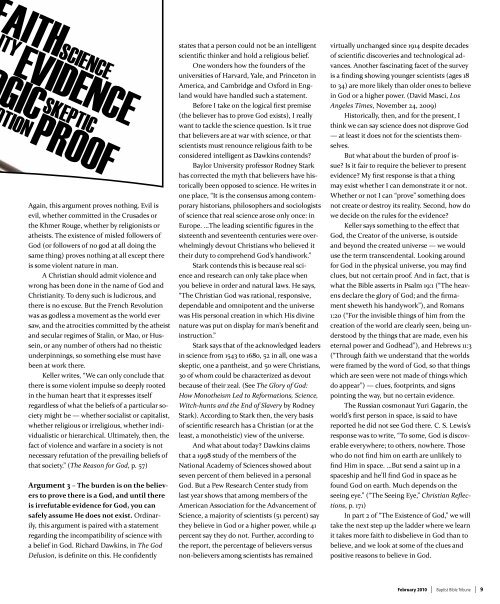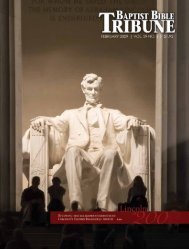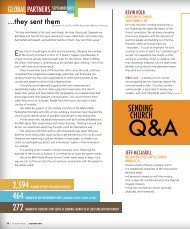The WidoW's mighT - Baptist Bible Tribune
The WidoW's mighT - Baptist Bible Tribune
The WidoW's mighT - Baptist Bible Tribune
- No tags were found...
Create successful ePaper yourself
Turn your PDF publications into a flip-book with our unique Google optimized e-Paper software.
AITH evidenceIC PROOFYSKEPTICIONSCIENCEAgain, this argument proves nothing. Evil isevil, whether committed in the Crusades orthe Khmer Rouge, whether by religionists oratheists. <strong>The</strong> existence of misled followers ofGod (or followers of no god at all doing thesame thing) proves nothing at all except thereis some violent nature in man.A Christian should admit violence andwrong has been done in the name of God andChristianity. To deny such is ludicrous, andthere is no excuse. But the French Revolutionwas as godless a movement as the world eversaw, and the atrocities committed by the atheistand secular regimes of Stalin, or Mao, or Hussein,or any number of others had no theisticunderpinnings, so something else must havebeen at work there.Keller writes, “We can only conclude thatthere is some violent impulse so deeply rootedin the human heart that it expresses itselfregardless of what the beliefs of a particular societymight be — whether socialist or capitalist,whether religious or irreligious, whether individualisticor hierarchical. Ultimately, then, thefact of violence and warfare in a society is notnecessary refutation of the prevailing beliefs ofthat society.” (<strong>The</strong> Reason for God, p. 57)Argument 3 – <strong>The</strong> burden is on the believersto prove there is a God, and until thereis irrefutable evidence for God, you cansafely assume He does not exist. Ordinarily,this argument is paired with a statementregarding the incompatibility of science witha belief in God. Richard Dawkins, in <strong>The</strong> GodDelusion, is definite on this. He confidentlystates that a person could not be an intelligentscientific thinker and hold a religious belief.One wonders how the founders of theuniversities of Harvard, Yale, and Princeton inAmerica, and Cambridge and Oxford in Englandwould have handled such a statement.Before I take on the logical first premise(the believer has to prove God exists), I reallywant to tackle the science question. Is it truethat believers are at war with science, or thatscientists must renounce religious faith to beconsidered intelligent as Dawkins contends?Baylor University professor Rodney Starkhas corrected the myth that believers have historicallybeen opposed to science. He writes inone place, “It is the consensus among contemporaryhistorians, philosophers and sociologistsof science that real science arose only once: inEurope. …<strong>The</strong> leading scientific figures in thesixteenth and seventeenth centuries were overwhelminglydevout Christians who believed ittheir duty to comprehend God’s handiwork.”Stark contends this is because real scienceand research can only take place whenyou believe in order and natural laws. He says,“<strong>The</strong> Christian God was rational, responsive,dependable and omnipotent and the universewas His personal creation in which His divinenature was put on display for man’s benefit andinstruction.”Stark says that of the acknowledged leadersin science from 1543 to 1680, 52 in all, one was askeptic, one a pantheist, and 50 were Christians,30 of whom could be characterized as devoutbecause of their zeal. (See <strong>The</strong> Glory of God:How Monotheism Led to Reformations, Science,Witch-hunts and the End of Slavery by RodneyStark). According to Stark then, the very basisof scientific research has a Christian (or at theleast, a monotheistic) view of the universe.And what about today? Dawkins claimsthat a 1998 study of the members of theNational Academy of Sciences showed aboutseven percent of them believed in a personalGod. But a Pew Research Center study fromlast year shows that among members of theAmerican Association for the Advancement ofScience, a majority of scientists (51 percent) saythey believe in God or a higher power, while 41percent say they do not. Further, according tothe report, the percentage of believers versusnon-believers among scientists has remainedvirtually unchanged since 1914 despite decadesof scientific discoveries and technological advances.Another fascinating facet of the surveyis a finding showing younger scientists (ages 18to 34) are more likely than older ones to believein God or a higher power. (David Masci, LosAngeles Times, November 24, 2009)Historically, then, and for the present, Ithink we can say science does not disprove God— at least it does not for the scientists themselves.But what about the burden of proof issue?Is it fair to require the believer to presentevidence? My first response is that a thingmay exist whether I can demonstrate it or not.Whether or not I can “prove” something doesnot create or destroy its reality. Second, how dowe decide on the rules for the evidence?Keller says something to the effect thatGod, the Creator of the universe, is outsideand beyond the created universe — we woulduse the term transcendental. Looking aroundfor God in the physical universe, you may findclues, but not certain proof. And in fact, that iswhat the <strong>Bible</strong> asserts in Psalm 19:1 (“<strong>The</strong> heavensdeclare the glory of God; and the firmamentsheweth his handywork”), and Romans1:20 (“For the invisible things of him from thecreation of the world are clearly seen, being understoodby the things that are made, even hiseternal power and Godhead”), and Hebrews 11:3(“Through faith we understand that the worldswere framed by the word of God, so that thingswhich are seen were not made of things whichdo appear”) — clues, footprints, and signspointing the way, but no certain evidence.<strong>The</strong> Russian cosmonaut Yuri Gagarin, theworld’s first person in space, is said to havereported he did not see God there. C. S. Lewis’sresponse was to write, “To some, God is discoverableeverywhere; to others, nowhere. Thosewho do not find him on earth are unlikely tofind Him in space. …But send a saint up in aspaceship and he’ll find God in space as hefound God on earth. Much depends on theseeing eye.” (“<strong>The</strong> Seeing Eye,” Christian Reflections,p. 171)In part 2 of “<strong>The</strong> Existence of God,” we willtake the next step up the ladder where we learnit takes more faith to disbelieve in God than tobelieve, and we look at some of the clues andpositive reasons to believe in God.February 2010 | <strong>Baptist</strong> <strong>Bible</strong> <strong>Tribune</strong> | 9
















